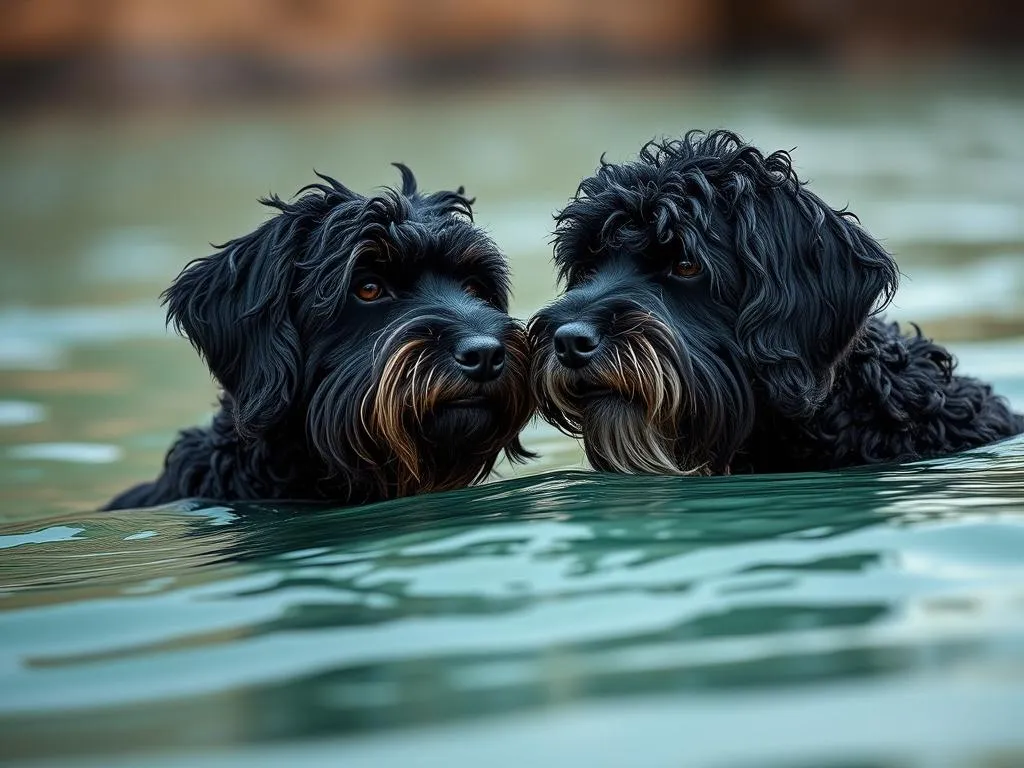
Introduction
Overview of Portuguese Water Dogs
The Portuguese Water Dog is a breed that captivates dog lovers with its unique blend of intelligence, energy, and loyalty. Originating from Portugal, these dogs were historically used by fishermen to herd fish into nets and retrieve lost gear from the water. Their robust physique, webbed feet, and water-resistant coat make them exceptional swimmers and versatile working dogs.
In addition to their impressive physical traits, Portuguese Water Dogs are known for their playful and affectionate nature. They thrive on human interaction and are typically eager to please, making them excellent family pets.
Purpose of the Article
In this article, we will explore the differences between male and female Portuguese Water Dogs. Understanding these gender differences is crucial for potential dog owners, as it can significantly influence their choice of a pet and the compatibility with their lifestyle.
Target Audience
This article is tailored for potential dog owners, dog enthusiasts, and breeders who seek to understand the nuances of this wonderful breed. By providing insights into the characteristics of male vs female Portuguese Water Dogs, we hope to assist in making informed decisions.
General Characteristics of Portuguese Water Dogs
Physical Appearance
Portuguese Water Dogs exhibit a well-proportioned build, typically weighing between 35 to 60 pounds and standing 17 to 23 inches tall at the shoulder. Their size may vary slightly between males and females, with males generally being larger.
The breed is known for its curly, dense coat that can be either wavy or curly, providing excellent insulation against cold water. They come in various colors, including black, white, and brown, often with unique markings. Grooming needs are essential, as their coats require regular brushing to prevent matting and frequent trimming to maintain a neat appearance.
Temperament
Portuguese Water Dogs are celebrated for their friendly and intelligent demeanor. They are known for being highly trainable, which is a testament to their intelligence and eagerness to learn. Their playful nature and high energy levels make them great companions for active families. These dogs are also known to be loyal and protective of their families, displaying a strong bond with their human counterparts.
Differences Between Male and Female Portuguese Water Dogs
Physical Differences
When comparing male vs female Portuguese Water Dogs, one of the most noticeable differences is their size. Males tend to be larger, averaging in weight from 40 to 60 pounds, while females generally weigh between 35 to 50 pounds.
In terms of coat, males might display a thicker, denser coat compared to females, which may require different grooming techniques. While both genders require regular grooming, you may find that males need more frequent clipping due to their thicker fur.
Temperamental Differences
Behaviorally, there are notable differences between male and female Portuguese Water Dogs. Males are often perceived as more playful and boisterous, while females typically exhibit a calmer demeanor. Males may display more dominant behavior, which can lead to challenges in social settings if not properly managed.
On the other hand, females often show stronger nurturing instincts, especially around children and other pets. They may be more affectionate and responsive to their owners’ moods, making them excellent companions for families looking for a loving dog.
Health Considerations
Healthwise, both genders are prone to certain conditions, including hip dysplasia and certain eye disorders. However, males may be more susceptible to certain hormonal-related issues, such as testicular cancer if not neutered, while females can face complications related to pregnancy and heat cycles.
In terms of lifespan, female Portuguese Water Dogs generally live longer than males, often reaching an average of 12 to 15 years compared to 10 to 14 years for males.
Social Behavior and Interaction
Male Portuguese Water Dogs
Males are often more exuberant in their social interactions. They tend to exhibit protective instincts, which can be beneficial for families looking for a dog that can serve as a watchdog. Their playful nature allows them to engage well with other dogs and humans, though supervision is recommended to manage any overly dominant behavior.
Female Portuguese Water Dogs
Females are typically more nurturing and may take on a maternal role, especially in homes with children. They are likely to form strong bonds with family members and often excel in situations where they can offer companionship. Their gentle demeanor makes them well-suited for families looking for a dog that interacts well with children and other pets.
Training and Obedience
Training Male Portuguese Water Dogs
Training male Portuguese Water Dogs can present some challenges due to their energetic and sometimes stubborn nature. Male dogs may require more consistent training and firm leadership. Techniques that work well include positive reinforcement and engaging activities that channel their energy effectively. Males often thrive in training environments that incorporate games and interactive play, which can keep their attention focused.
Training Female Portuguese Water Dogs
Female Portuguese Water Dogs often exhibit a willingness to please their owners, which can make training easier. However, it is essential to approach training with patience and consistency. These dogs respond well to gentle correction and positive reinforcement. Engaging in training sessions that include socialization with other dogs can enhance their adaptability and reduce anxiety in new situations.
Lifestyle and Activity Levels
Exercise Requirements
When considering male vs female Portuguese Water Dogs, it’s essential to note their exercise needs. Both genders are active and require regular exercise to maintain their physical and mental health. Males may have slightly higher energy levels, necessitating more rigorous activity and playtime. A daily routine that includes walks, play sessions, and mental stimulation is crucial for both males and females.
Adaptability to Living Conditions
Portuguese Water Dogs are adaptable to various living conditions. However, families with limited space, such as apartments, should consider the dog’s energy level when choosing between a male or female. Males may be more prone to restlessness in smaller spaces, while females might adapt better. Regardless of gender, these dogs thrive in homes where they have access to outdoor space for exercise and play.
Personal Experience and Anecdotes
Testimonials from Owners
Many owners of Portuguese Water Dogs have shared their experiences regarding gender differences. One male owner noted that his dog was a constant source of energy, requiring frequent play and attention. In contrast, a female owner mentioned her dog’s ability to sense when her children were upset, often providing comfort and companionship.
These real-life stories highlight the distinct behavioral traits that can influence a family’s decision when choosing a dog.
Expert Opinions
Dog trainers and breeders emphasize the importance of understanding individual personality traits over strict gender roles. While there are general tendencies in behavior between males and females, each dog is unique, and factors such as early socialization, training, and environment play significant roles in shaping their behavior.
Conclusion
Summary of Key Points
In summary, the differences between male and female Portuguese Water Dogs can influence a potential owner’s choice. Males are often larger and more energetic, displaying playful and protective behaviors, while females tend to be smaller, calmer, and more nurturing. Both genders require consistent training, socialization, and exercise to thrive.
Final Thoughts on Choosing a Gender
When considering a Portuguese Water Dog, it is vital to assess your family’s dynamics and lifestyle. While gender may offer some insights into behavior, individual personality traits are crucial in determining the right fit for your home. Whether choosing a male or female, each dog has its unique charm and characteristics that can enrich your life.
By understanding these differences, potential owners can make informed decisions that will ultimately lead to a fulfilling and harmonious relationship with their new canine companion.









